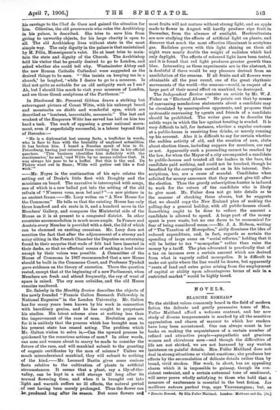NOVELS.
BLANCHE ESMEA D.* To the strident voices commonly heard in the field of modern fiction the delicate and gently persuasive tones of Mrs. Fuller Maitland afford a welcome contrast, and her new study of diverse temperaments is marked by all the sensitive appreciation and charm of manner to which her readers have long been accustomed. One can always count in her books on making the acquaintance of a certain number of refined and attractive people—sympathetic and gracious women and chivalrous men—and though the difficulties of life are not shirked, we are not harassed by any wanton insistence on painful details. Mrs. Fuller Maitland does not deal in strong situations or violent emotions ; she produces her effects by the accumulation of delicate details rather than by broad, vivid strokes. Her work, in short, has an appealing charm which it is impossible to gainsay, though its con- sistent restraint, and a certain autumnal tone of sentiment, will never prove wholly satisfying to those who hold that a measure of exuberance is essential in the best fiction. Les meilleurs auteurs patient trop, says Vauvenargues ; but, as
• Blanche Ennsad. By Ella Fuller Maitland. London : Methuen and Co. [6s.]
always happens in the case of such sweeping generalisations, there are maxims almost equally respected maintaining the converse of this proposition. The virtue of reserve and the value of the art of omission are insisted on by many high authorities, and are illustrated in Mrs. Fuller Maitland's writings. Still, it may be contended that her fastidiousness leads to one-sided results, and that she sometimes achieves distinction at the loss of vitality.
In the story before us most of the characters fall into two clearly defined categories,—charming inefficiency and angular virtue. The heroine and her greatest friend, Mrs. Leslie, are both the victims of ill-assorted marriages; but while in the case of Mrs. Leslie the death of a tiresome husband has reduced her burden to the care of two unsympathetic and tyrannous step-daughters, Blanche Esmead, fragile, picturesque, artistic, is still tied to a partner with whom she has not a thought or interest in common. Blanche is designed by antecedents and temperament to be a rich man's wife, but, being suddenly left an orphan, she rashly casts in her lot with a bard-working East End curate. John Esmead is given a living in the country, and at the opening of the story we find her installed in a brand-new, hideous sham-Gothic vicarage. She has no genius either for house- keeping or for parish work ; her husband's blundering ways, his homely, undistinguished manners and boisterous optimism, grate on her at every turn. She makes no effort to help him or render the house more comfortable, finds her only solace in the companionship of Mrs. Leslie, and spends most of her time away from home. John Esmead, on his side, is a miracle of patient but tactless unselfishness, and is wholly unconscious of his inability to excite the faintest spark of affection in his wife, whom he worships with a dog-like devotion. At an early stage in the story it becomes pretty clear that Blanche will be unable to endure the companionship of her husband, but that, on the other hand, she respects him—and herself— too highly to attempt any irregular exit from this matri- monial impasse. The situation is rendered all the more delicate by her finding her true affinity in Mrs. Leslie's step- brother-in-law, an agreeable and high-minded bachelor, who is happily free from the disagreeable qualities of his half- brother. As both Blanche and Basil Forde are ex hypothesi incapable of dishonourable conduct, Mrs. Fuller Maitland is driven to eliminate the robust and blameless clergyman by a bicycle accident at the moment when his wife is believed, by him and others, to be dying. John succumbs to his injuries, and Blanche recovers to marry Basil Forde after a decent interval, Mrs. Leslie having meantime embarked prosperously on a second marriage with the heir to a peerage. Mrs. Fuller Maitland evidently does her best to hold the balance fairly between her decorative incapables and her repellent worthies. Indeed, she goes so far on p. 289 as to admit that " the Vicar was a much better man than Blanche was a woman—much more unselfish, much more dutiful, and for all his dense obliviousness in many directions, possessed of a lively sense of the omnipotence of God, and the reality of the spiritual life, which Blanche had not yet reached." On the other hand, she has so successfully emphasised his angu- larities, and so elaborately insisted on Blanche's attractions and helplessness, as to make it very difficult to acquit her of undue sympathy with her selfish, futile heroine. It is at any rate unlucky that the denoament should be so contrived (without any suggestion of satire) as to reward the selfish, to secure the survival of the inefficient, and to cut off the strenuous altruist in his prime. The plain person, therefore, will probably find the moral of the story too obscure to be satis- factory, though he can hardly fail to be interested by the author's skill and delicacy of portraiture.















































 Previous page
Previous page